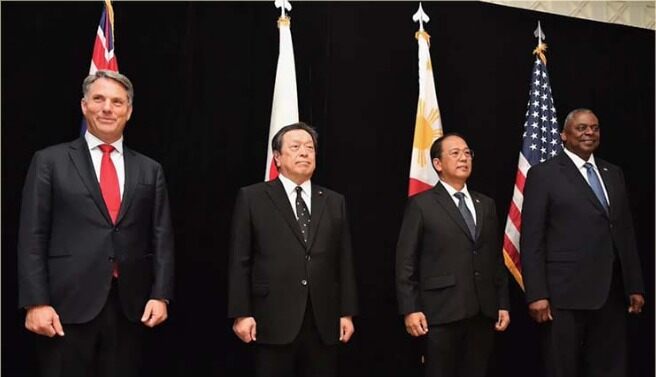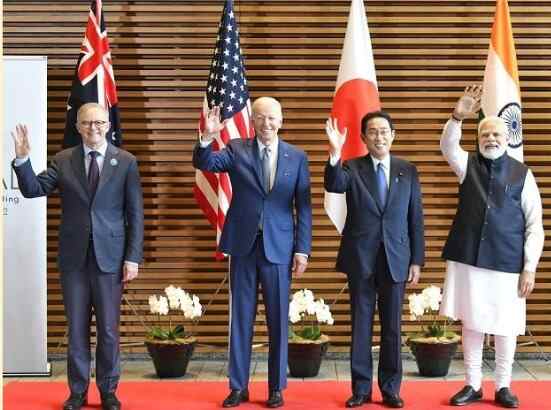Recent developments in India in the Indo-Pacific region have sparked discussions about potential shifts in US alliances and the dynamics within the Quadrilateral Security Dialogue (Quad), which includes the United States, India, Japan, and Australia.
The emergence of a new grouping called the “Squad,” comprising the US, Japan, Australia, and the Philippines, has led to speculation about India being sidelined. However, a closer examination reveals a more nuanced picture that underscores the evolving nature of strategic alliances in the Indo-Pacific.
India’s Indo-Pacific Strategy
India’s role in the Indo-Pacific is characterized by India’s strategic autonomy and balancing act among major powers. India’s continued strategic partnership with Russia, including defense purchases and historical ties, has caused friction with the US and other Quad members, particularly in light of the Ukraine conflict. India’s neutral stance on the Ukraine war, driven by India’s strategic interests, emphasizes India’s desire to maintain an independent foreign policy.
Furthermore, India’s relationship with China is complex and multifaceted. While border disputes and strategic rivalries persist, India also engages with China through platforms like BRICS and the Shanghai Cooperation Organization (SCO).
This balancing act underscores India’s approach to maintaining a stable regional power equilibrium. Consequently, India’s nuanced stance presents challenges for deeper military alignment with the US, as New Delhi seeks to avoid entanglements that might compromise India’s strategic autonomy.
India’s strategic choices reflect India’s prioritization of maintaining flexibility in foreign policy decisions. By balancing relationships with Russia, China, and the US, India aims to safeguard its national interests without becoming overly dependent on any single power. This approach allows India to navigate the complex geopolitical landscape of the Indo-Pacific while reinforcing India’s role as a key regional player committed to maintaining stability and security.
India’s Approach to Ukraine-Russia Relations
The divergence in the US and India’s approaches to the Ukraine conflict highlights underlying tensions within the Quad. The US and its Western allies have imposed stringent sanctions on Russia and sought to isolate it diplomatically.
In contrast, India has adopted a neutral stance, refraining from condemning Russia outright and continuing its economic and military engagements with Moscow.
India’s position is influenced by several factors, including its dependence on Russian military equipment, historical ties dating back to the Cold War, and the need to hedge against China by maintaining diversified strategic partnerships.
India’s relationship with Russia is strategic and rooted in a long-standing partnership that has been crucial for India’s defense needs.
While this stance has strained relations with the US and other Quad members, it also reflects India’s prioritization of its national interests and strategic autonomy. By maintaining a neutral position, India aims to preserve its strategic flexibility and avoid entanglement in conflicts that could compromise its broader geopolitical goals.
India’s approach underscores its commitment to an independent foreign policy that balances its various strategic relationships. This careful balancing act allows India to navigate the complexities of global politics while ensuring that its national interests are safeguarded.
Analyzing the Emergence of the Squad

The formation of the Squad signifies a heightened focus on collective defense against potential Chinese aggression, particularly in the South China Sea and around Taiwan. This development aligns with the US’s strategic goal of bolstering military partnerships to counter China’s growing influence and assertiveness in the region.
The South China Sea, a vital maritime trade route, has been a flashpoint for territorial disputes, with China laying extensive claims that conflict with those of several Southeast Asian nations, including the Philippines.
For India, the Squad’s strategic focus on the South China Sea and Taiwan Strait marks a distinct approach from the Squad’s broader agenda. While the Quad addresses security concerns, its scope extends to maritime security, economic cooperation, climate change, and disaster relief.
This broader focus fosters a comprehensive regional partnership addressing various challenges, promoting stability and prosperity across the Indo-Pacific, including India’s interests.
India views the Squad’s emphasis on military readiness and strategic deterrence as complementary to its security interests. Meanwhile, the Quad provides India with a platform to engage on various issues beyond military concerns, aligning with India’s long-term vision for regional stability. The emergence of the Squad does not undermine India’s role in the Quad but complements it, enhancing India’s strategic partnerships and regional influence.
The Role of Quad and the Squad in Shaping India’s Foreign Policy
The Squad, comprising the US, Japan, Australia, and the Philippines, appears to be a more cohesive military grouping with a clear focus on deterring Chinese expansionism, particularly in the contentious waters of the South China Sea. This focus on military readiness and strategic deterrence differentiates it from the Quad’s broader, multifaceted agenda, which includes India as a key member.
India’s strategic perspective is essential when comparing the roles of the Quad and the Squad. The Quad’s broader mandate allows it to address various issues, from cybersecurity and infrastructure development to climate change and health security.
This multifaceted approach is designed to foster a resilient and stable Indo-Pacific region through comprehensive cooperation. For India, the Quad’s inclusive agenda aligns with its long-term strategic goals of promoting regional stability and prosperity.
India views the Quad as a crucial platform for dialogue and collaboration on various regional issues. India’s participation in the Quad aligns with its strategic objectives of promoting a free, open, and inclusive Indo-Pacific.
Through the Quad, India can address critical issues such as maritime security, essential for protecting its extensive coastline and economic interests. Moreover, the Quad’s focus on economic cooperation and infrastructure development is significant for India, as it seeks to enhance regional connectivity and trade.
The emergence of the Squad does not undermine India’s role in the Quad but rather complements it by focusing on specific military threats. For India, the Squad’s emphasis on military deterrence in the South China Sea and Taiwan Strait regions aligns with its strategic interests in maintaining regional stability.
India’s Place in the Quad: Future Scenarios and Implications
Despite the emergence of the Squad, India remains a crucial player in the Indo-Pacific landscape. India’s vast population, growing economy, and strategic location make it an indispensable partner for the US and other Quad members. The strategic value of India lies not only in its geographic position but also in its ability to balance China’s influence in the region.
India’s significance within the Quad is undeniable. With its growing economic prowess and large population, India brings substantial resources and influence. Its strategic location in the Indian Ocean region enhances the Quad’s capabilities in countering maritime threats and promoting regional stability. Furthermore, India’s commitment to upholding democratic principles aligns with the Quad’s shared values, strengthening the alliance’s cohesion.
The US is likely to pursue a dual-track approach in its engagements with India. This approach entails maintaining robust bilateral and multilateral ties with both the Quad and the emerging Squad. By doing so, the US can leverage the unique strengths of each grouping, ensuring a comprehensive strategy to address regional security challenges effectively. India’s active participation in both the Quad and the Squad enhances the US’ ability to promote stability and prosperity in the Indo-Pacific region.
India’s role in the Quad also serves as a counterbalance to China’s growing assertiveness in the region. As China seeks to expand its influence through initiatives like the Belt and Road Initiative (BRI) and military build-up in the South China Sea, India’s presence in the Quad provides a crucial check on Chinese ambitions. By working closely with India and other Quad members, the US can mitigate the risks posed by China’s aggressive behavior and uphold a rules-based order in the Indo-Pacific.
India’s strategic importance extends beyond its role in the Quad. As a key player in the region, India’s cooperation is essential for addressing a wide range of challenges, including maritime security, counterterrorism, and economic development. By strengthening its partnerships with India, the US can advance its interests in the Indo-Pacific while promoting regional stability and prosperity.
Conclusion
In conclusion, the emergence of the Squad does not undermine India’s role in the Quad but rather complements the broader objectives that India pursues through its involvement in the Quad. By participating in both the Quad and engaging with the Squad, India can leverage diverse strategic partnerships to enhance its regional influence and contribute to a stable and prosperous Indo-Pacific.
India’s continued participation in the Quad is vital for the alliance’s effectiveness and relevance in the Indo-Pacific. By recognizing India’s strategic significance and actively engaging with it, the US can reinforce its leadership role in the region and address the diverse challenges facing the Indo-Pacific. With India’s cooperation, the Quad can serve as a cornerstone of regional security and cooperation, ensuring a free, open, and inclusive Indo-Pacific for generations to come.
BY SNEHA RAJ
MUST READ: WILL THE CONFLICT BETWEEN IRAN AND ISRAEL GIVE RISE TO WORLD WAR 3?


